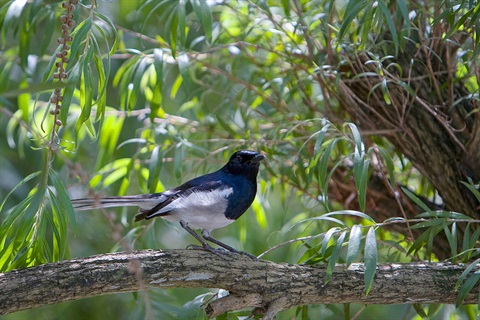Local wildlife

West Torrens is home to many native animals including birds, frogs, lizards and mammals. Plants and animals recorded in the area can be viewed on the Atlas of Living Australia .
The River Torrens is home to Rakali, also known as the Water Rat (Hydromys chrysogaster), one of only two amphibious mammals in Australia. The other is the platypus.
With its webbed hind feet and waterproof coat, Rakali live in burrows along water courses and riverbanks, emerging in the evening, at sunset, or early in the morning. Rakali are sometimes mistaken for introduced rats, however their white-tipped tail, abundant whiskers, and white to golden belly are key distinguishing features.
Rakali are a top predator and their presence is a good indicator of the health of the water environment they live in. If they are present, a diverse range of other animals in the food chain must also be available to support them. Being carnivorous they rely on a wide variety of fish, crustaceans such as yabbies and aquatic insects to make up the bulk of their diet.
Rakali have also being known to consume birds, mammals, frogs, reptiles, mussels and spiders. They forage for food close to the river banks in shallow water, or they can dive deeper in search of more elusive aquatic prey.
During the 1930s Depression, Rakali were heavily hunted for their fur after a ban on the import of furred skins led to the search for a local alternative. Today Rakali are protected under the National Parks and Wildlife Act, however more immediate threats include cats, foxes, and changes to land use and accidental trapping in yabby pots. Yabby pots in the River Torrens are impacting local populations of Rakali, which become entrapped and drown in these traps.
Rakali do not cause harm to humans or property. Although classed as a native rodent, they are not like the introduced rat which will enter gardens in search of fruit or vegetables. Rakali are carnivorous and do not consume fruit or vegetables as part of their diet. They are also shy and reclusive and will not enter roofs or wall cavities like rats.
Today, species such as this are an important reminder about the diversity which still exists and the importance of protecting it. Apart from possums, Rakali are one of the last remaining large native mammals that can still be found in urban Adelaide.